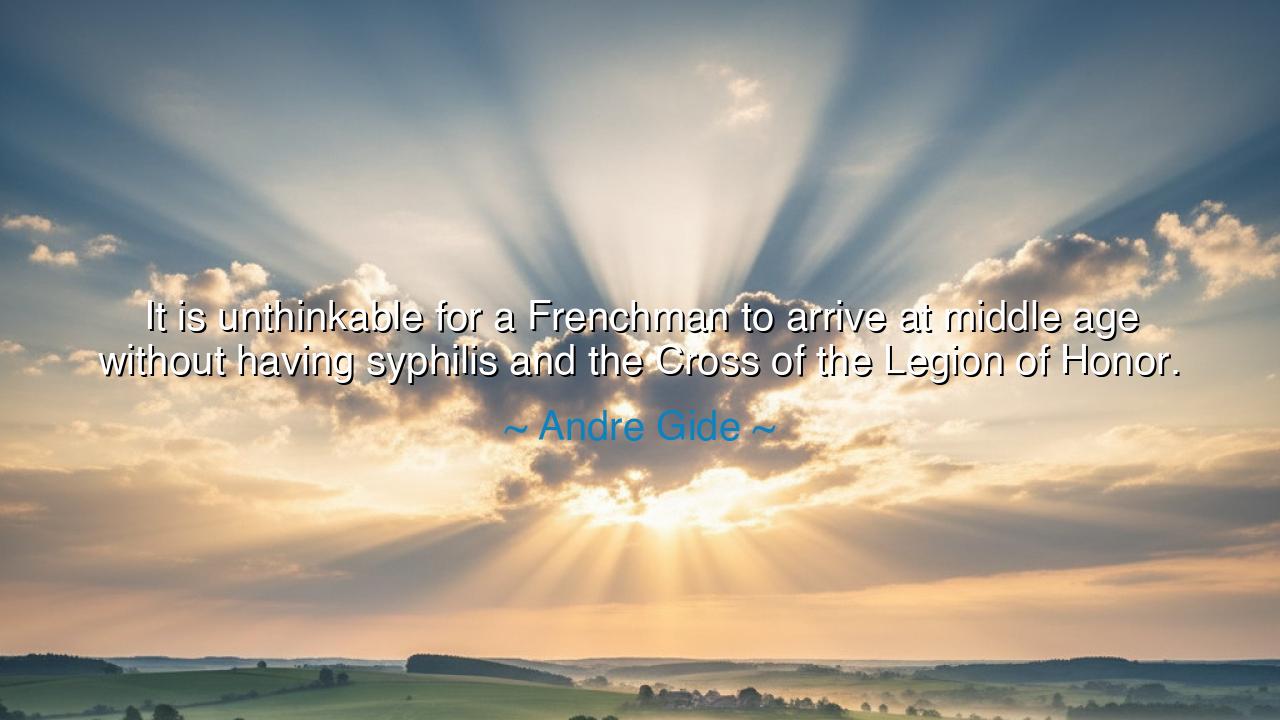
It is unthinkable for a Frenchman to arrive at middle age without
It is unthinkable for a Frenchman to arrive at middle age without having syphilis and the Cross of the Legion of Honor.






In the intricate tapestry of life, there are moments when the world itself seems to speak in riddles, veiled in the complex interplay of culture, honor, and fate. It is in these moments that the words of André Gide ring out with profound irony and insight. He once proclaimed, “It is unthinkable for a Frenchman to arrive at middle age without having syphilis and the Cross of the Legion of Honor.” At first glance, such a statement might seem a jest—a playful critique of the human condition. Yet beneath this provocative claim lies a deeper truth, one that speaks to the very heart of society, honor, and the complexity of human life.
In Gide’s words, we see an acknowledgment of the paradox that resides at the core of the French identity, or indeed, any human identity shaped by the clash between virtue and vice. The Legion of Honor, a symbol of the highest recognition for acts of valor and achievement, stands as a beacon of honor, an ideal that calls one to rise above the mundane and be marked by greatness. Yet, at the same time, syphilis, a disease of the body and soul, symbolizes the inevitable flaws, the imperfections, the dark side of human nature that no one can escape. Gide's statement is not merely about the external achievements or failures of men; it is a reflection on the very nature of human struggle—how greatness and suffering are often entwined, how the best and the worst coexist within the same soul.
In the ancient world, such contradictions were often seen as the essential fabric of the heroic journey. Consider the life of Alexander the Great, whose conquests stretched from Greece to India, a man who achieved legendary greatness but who was also deeply flawed. His victories were unparalleled, yet his personal life was marred by cruelty, indulgence, and internal conflict. His own greatness was shadowed by the darker side of his nature—his inability to reconcile ambition with humanity. Much like the Frenchman that Gide describes, Alexander was both a hero and a tragic figure, embodying both the glory of victory and the suffering that accompanies great power.
Indeed, Gide’s words reflect not only the contradictions of a nation or a person, but of the very nature of life itself. It is unthinkable, as he suggests, for one to reach maturity without conflict, without the scar of something endured—be it a disease, a loss, a regret, or a battle. These burdens, though painful, are what shape us, what mold us into the beings we become. Just as a warrior gains honor through struggle and sacrifice, so too does the individual suffer the afflictions of life—illness, failure, heartbreak—those things that bring us closer to the reality of what it means to be human. The Legion of Honor represents the triumph of the spirit, but the syphilis represents the shadow that always lingers, the reminder that even in victory, we are never free from the struggles that define our existence.
Let us consider, too, the story of Napoleon Bonaparte, another towering figure in French history. Napoleon, a man of profound military genius and remarkable ambition, was celebrated across the world, adorned with the highest honors of France, including the Cross of the Legion of Honor. Yet, beneath this outward glory, Napoleon's life was fraught with turmoil—his empire crumbled, his personal relationships were marred by ambition and betrayal, and his final years were spent in exile, far from the grandeur of his youth. He, too, was a man of contradiction, a symbol of both greatness and suffering, much as the Frenchman Gide imagines.
Thus, we learn that life is a mixture of the light and the dark, of honor and suffering. In this sense, Gide’s words are a reflection on the human condition, a reminder that we are never fully defined by our successes or our failures alone. The crosses we bear and the honors we receive are both parts of the same whole. It is in the struggle, the suffering, and the joy that we find the essence of life itself. Just as the Frenchman must bear the syphilis as part of the passage to middle age, so too must he bear the honor that comes with the fulfillment of his duties. Both, in their own way, shape the man, defining him and preparing him for what lies ahead.
Therefore, let us take this lesson to heart: the greatness we seek is often tempered by the suffering we endure. The struggles we face, the flaws we cannot escape, and the honors we receive are not separate threads, but are intertwined in the rich fabric of life. To be fully human is to embrace both the joy and the pain, the success and the failure, for it is through these that we truly understand who we are and what we are capable of. The lesson of Gide’s words is this: do not shy away from the challenges that life presents, for they are not obstacles to greatness but rather the very means by which greatness is achieved. Embrace both the light and the dark, for they are the dual forces that will carry you through to the fullness of your own journey.






AAdministratorAdministrator
Welcome, honored guests. Please leave a comment, we will respond soon